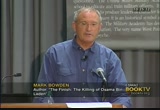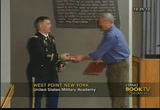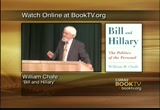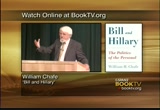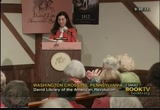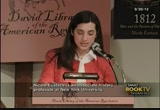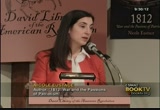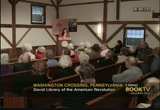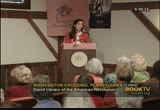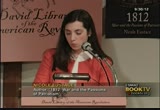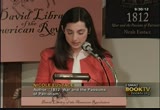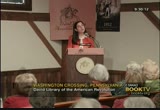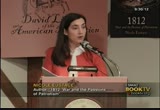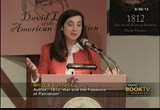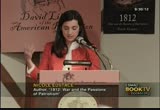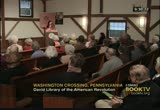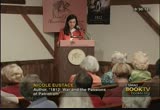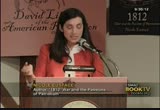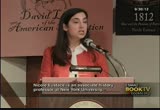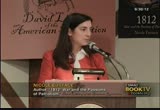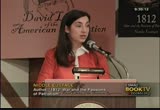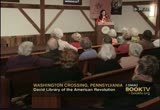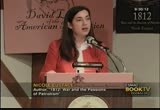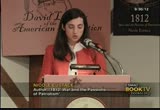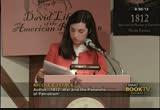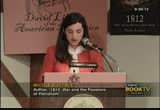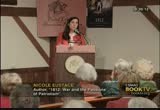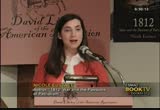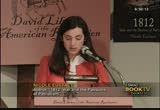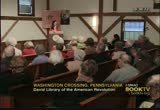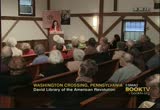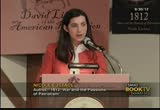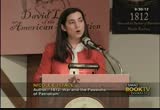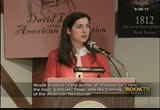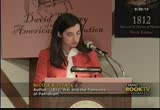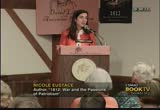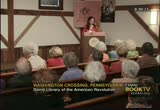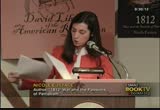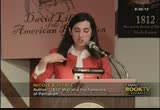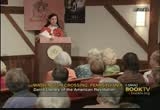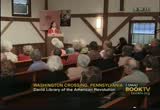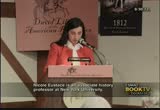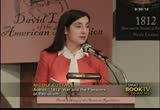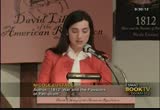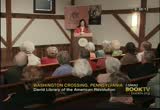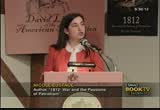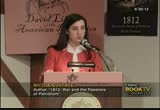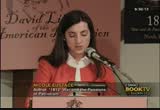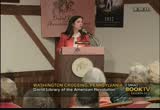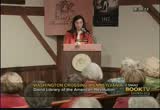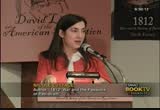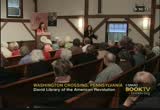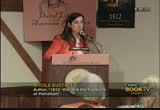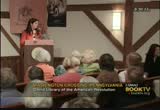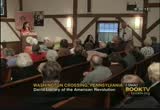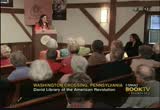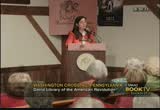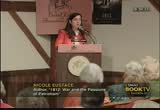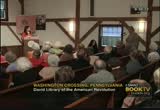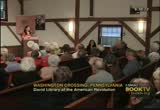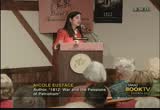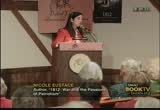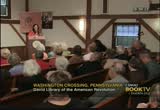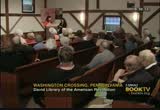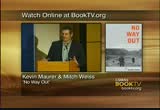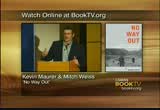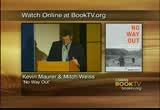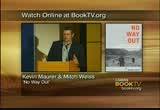tv Book TV CSPAN November 24, 2012 6:00am-7:15am EST
6:59 am
>> what happened to the men, did they go home or did they go to the guard industry? the guard industry was definitely a couple centuries a way. not a couple, but one. one century away. no, most of them were repatriated. there were furloughs and exchanged, and the british thought it would be to their strategic advantage to do so. of course, he got home only to face a court-martial, so that didn't work out quite so well for him. [laughter] >> [inaudible]
7:00 am
>> the question is, what's the canadian perspective of the war of 1812, how is it taught up there? i should say, first, i have no firsthand knowledge of this. i teach at nyu. but i have been talking to canadian colleagues quite a bit this year on various panels, and what i'm hearing is that in canadian, this is really celebrated as the important war that made the canadian nation, that this might not have been a victory for either the unite or great britain, but -- the united states or great britain, but canada regards it as a victory for them. they turned back american invasion efforts, and after the 1812 war from then til now, there's never been a cross-border conflict. >> i can confirm that. i'm an american who spent a good part of my youth in canada, went to school there. and, yes, it's very much a source of canadian pride that the americans were beaten.
7:01 am
[laughter] >> thank you for that. yes. >> i went to school in australia, and we had detailed history of the revolution, boston tea party and so on. and then of the american civil war. we knew almost everything about that. we had the battle of antitee tunnel and gettysburg and so on. into when i came here in 1957, i found i really knew a lot more about the revolution and the civil war than colleagues here, students and academics. but we never heard a word about the war of 1812. it was not mentioned, and it was not in our history. any idea why that should be?
7:02 am
>> the speaker noted that he was educated in australia, and there was quite a comprehensive education on the topics of the american revolution and the american civil war but almost nothing on the war of 1812, and why might that be? well, the british did not tend to regard the american war of 1812 as a particular significant war at all. for the british, this was just a side show in the global war with napoleon. so for them the war of 1812 is not as important as the one that's happening on the european continent, so that might have something to do with what was taught in australia. but the fact of the matter is, it doesn't taught very much here either. if you just look at this in military and diplomatic terms, it didn't change very much for the united states. but i think it's worth taking a new look at it from a cultural
7:03 am
perspective and thinking about what it means to declare war in a democracy and how you use popular culture to mold public opinion. yes. >> seems to me the war came to an end rather abruptly even after the defeat of -- [inaudible] and before new orleans. the peace treaty having been signed before the battle of new orleans. the british were winning. why was it ended so abruptly? >> well, um, negotiations for peace actually started almost as soon as the war began. the british really weren't interested in fighting this war. as i say, for most of it they really had their hands tied with napoleon, and even once he was defeated they still just financially and logistically were really not interested in this fro tracted -- protracted conflict. they never had a goal of retaking the u.s. so negotiations started from the
7:04 am
very beginning. and one of the interesting notes about this war is one of the declared reasons for the war were these so-called british orders in council which had to do with interfering with american shipping rights. the british actually rescinded in wars -- the wars in council before the united states declared war, but because of transatlantic delays in communication, the u.s. didn't know it. so by the time the war officially broke out, the british had already conceded one of the major point that is the u.s. supposedly wanted action on. so really the british were never committed to this war, but, you know, when the u.s. declared war, today had to respond. so if anything, the peace treaty probably wasn't abrupt, it was a very long time coming. >> hi. >> oh, hi. >> thank you very much. it was a very interesting talk. i'm wondering, the 50th anniversary of the war of 1812, of course, was 1862, right at
7:05 am
the beginning of the civil war. i'm wondering if the way that the united states remembered the war of 1812 was in any way affected by the carnage that you pointed out. >> um, was it affected by the carnage that i pointed out? no. just to clarify, there wasn't much carnage in the war of 1812. so the question would be -- >> well, the carnage of the civil war. >> that is such a fascinating question. i feel like you just gave me a new book project. [laughter] the answer is, i don't know. but it would be really interesting to go back and look. i have to think that they may have been too preoccupied to really do a lot of commemorating. in fact, i think that 1812 commemorations were much more prominent at the 75th anniversary than at the 350th. -- 50th. so that's what i would say quickly, but i think it's a really interesting question.
7:06 am
>> thank you. >> [inaudible] and how might that have changed after the war of 1812? >> we had a very, very small regular army at the outset of the war, and it did change after the war. one of the lessons they learned was that they really did need a regular army. now, this is the lesson that had been learned, obviously, during the american revolution, but there was also a real fear of standing armies at the time of independence because of experience with britain. people today dent realize that -- don't realize that in the 18th century a standing army was literally standing in your house. the british didn't build army barracks. when they stationed troops in boston, they were quartered in private people's homes. like it on or not. so there was a real worry about the dangers of the standing army, and that prevented the nation from really kind of learning the lessons of the revolution which was that having a well-trained, disciplined and supplied fighting force was
7:07 am
really crucial to beingfective. -- being effective. that was washington's achievement, to kind of put that in place by the end of the revolution. so when hull started out in the summer of 1812, he had a very small number of regular troops, a few hundred. compared to a few thousand militiamen, most of whom had never seen active service and were none too happy to be marched away from their homes hundreds of miles through the woods to the fort at detroit. because the idea with militia was that it was a home guard. up supposed to literally defend -- you were supposed to literally defend your local commitment. and people were rightfully worried that if they marched off to serve in faraway battlefields, they were leaving their own homes undefended. so this was really an untenable system that created quite a few problems on the ground in 1812. they were only really finally surmounted at the battle of new
7:08 am
orleans. now, recent history has actually shown that there were more regular troops and better ammunition at new orleans than popular myth back in 1815. but in 1815 what people were really celebrating was the idea that jackson had gone to battle with this total rag tag mig shah, the kentucky boys, and they have -- militia, the kentucky boys, and that they had succeeded in overcoming earlier problems. yes. >> the american navy had some ip newspapers in the war of -- influence in the war of 1812, finally got established there, and i'm wondering if your theory on romantic passion had anything related to the navy, because i always thought sailors were more romantically passionate than -- [laughter] >> thank you so much. the question is, weren't the
7:09 am
sailors even more romantic and passionate than the soldiers, and what about the navy in the war of 1812? thank you very much for the question. i actually have a whole chapter on sailors in the book. you have to kind of figure out what your -- what you're going to abstract, so i didn't even mention the sailors, but you are right. they're very much in the same kind of patriotic vein that we have been talking about. >> what was general hull's involvement in the american revolution? >> he, he was an officer in the american revolution, and, you know, quite successful. i can't name his individual battles off the top of my head. but, yeah, he was a successful officer. >> do you have any further questions for professor use
7:10 am
stays, you can ask them downstairs at the reception. i have a gift for you, this is a pen made from wood from a tree at the battle of trenton, as well as a bookmark. >> thank you, i'm very touched. that's lovely. >> thank you very much for your wonderful lecture. >> thank you all. [applause] [inaudible conversations] >> this program was hosted by the david library of the american rev ruse in -- revolution in washington crossing, pennsylvania. visit dlar.org. >> it's in the northeast part of afghanistan, it cannot be more remote. it's, it's where god lost his shoe. i mean, this valley is a
7:11 am
cul-de-sac that goes nowhere, and it's, it's up near the himalayas. so getting up there's hard, flying helicopters is hard. the only way in was by foot or helicopter. so trying to get there initially to plan the mission was stuff tough. was tough. what they were up there to do was go after a hvp, a high-value target. and this guy was a terrorist commander that had some association with al-qaeda, had some sort of truce with the taliban, but these guys are nasty characters. a lot of foreign fighters, guys that aren't really there to fight for afghanistan or fight for their version of afghanistan, these guys are mercenaries. and what he was doing in the area was recruiting, well, pressing people into fighting for the hague, and he was rumored to have surface-to-air missiles and was stockpiling
7:12 am
guns. and he was also credited with a series of ambushes in the corn gal valley that had caught the attention of some of the commanders. he was able to export a lot of the violence from this safe haven, so the idea was to go get him and take careful of this safe haven. but what they ran into was not only were they fighting the geography because it was such a hard place to get to, they were also fighting some of the restrictions that are placed on units now in afghanistan. i'm sure we've all seen the news, right? these night raids are highly regulated, who controls the battle space is highly regulated, and it takes a long time to get a mission planned. one of the things they were running into getting this mission planned was how to get there, what the helicopters could do and what -- when and where they'd be allowed to go.
7:13 am
and essentially what they came back with was the idea that they were going to fly to the valley, land in the valley, unload their soldiers and then fly off. now, the team initially wanted to fly up to the top of the valley, to the top of the village and fast rope down. essentially, they rappel out of the helicopter, and then the helicopter would fly off. because of what the pilots were comfortable doing, they end up having to settle for this mission which was to land in the valley and unload their troops which anyone who knows any kind of basic ip fan try tactics, to fight uphill is never, never a good idea. you never want to do it. that's sort of, you know, infantry 101. if you can take the high ground, you want it. so what the commanders had to pretty much reconcile was where they were going to praise the risk. was it prisonnier to put -- prisonnier to have them at the top of the village? so that's sort of where the team was left on the morning to of te
7:14 am
mission which is where the book starts. it's spring in the mountains of afghanistan, the weather has already delayed the mission once or twice, and they all have this sinking feeling that i don't know if this is a good #kwr-d. and that feeling is the within within -- is one of the things that propelled this week and propelled us. because it's very rear that you get soldiers that have universal bad feelings and the candor to stand up and say, hey, we took it up the chain, and we really don't want to do this mission. and that sort of starts this book, and it also starts them on this path that ultimately gets them in an ambush. >> and that's pretty critical, what kevin just mentioned in the book. you don't usually get soldiers who speak out about flaws in a plan. and there was a captain, captain kyle walton, who basically knew -- just like othe
60 Views
IN COLLECTIONS
CSPAN2 Television Archive
Television Archive  Television Archive News Search Service
Television Archive News Search Service 
Uploaded by TV Archive on

 Live Music Archive
Live Music Archive Librivox Free Audio
Librivox Free Audio Metropolitan Museum
Metropolitan Museum Cleveland Museum of Art
Cleveland Museum of Art Internet Arcade
Internet Arcade Console Living Room
Console Living Room Books to Borrow
Books to Borrow Open Library
Open Library TV News
TV News Understanding 9/11
Understanding 9/11